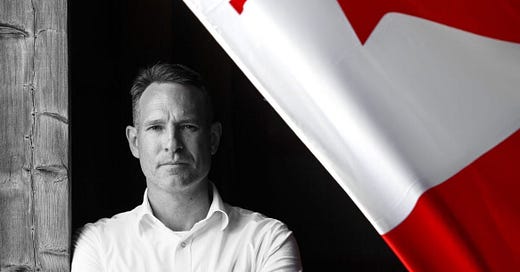Squeezed at Both Ends: Why Higher Incomes Aren’t Keeping Up with the Real Cost of Living
By Tom Marazzo
You’re earning more than you ever have. But you feel poorer.
You work hard. You do what you’re supposed to do. Maybe you finally crossed the six-figure mark. Maybe you got that raise. But your groceries are more expensive, your rent is crushing, and your tax bill makes you question whether it’s worth striving at all.
That sinking feeling? It’s not your imagination.
Across Canada, and especially in Ontario, people are being squeezed from both ends. On one side: inflation. On the other: taxes. You earn more, but everything costs more—and the government takes more. It’s a triple hit that leaves you with less.
This article isn’t just about economics. It’s about a broken promise. A promise that if you work harder, you’ll get ahead. But too many Canadians are finding that working harder only puts them deeper in the hole.
What Does “Nominal” Really Mean?
Let’s start with one simple definition that explains how we got here.
Nominal income is your salary in today’s dollars—the number on your paycheck. Real income is what that money is actually worth when you go to spend it. And here’s the truth: even as your nominal income goes up, your real income may be going down.
If you earned $100,000 in 2014, you’d need about $127,000 in 2024 just to have the same standard of living. So if you’re making $115,000 today and wondering why you feel behind—it’s because you are.
When More Money Doesn’t Matter
Between 2014 and 2024, the average salary in Ontario rose from $55,500 to $67,500. That sounds good—until you realize that inflation wiped out every bit of that gain.
At higher income levels, it gets worse. A six-figure salary used to mean stability. Today, it means survival. People earning $100,000 or $120,000 aren’t living comfortably. They’re calculating whether they can afford to have a second child. Or ever buy a home.
The Government’s Cut, Your Risk
Here’s the part that really stings: every time you make money, the government takes a cut—without contributing anything.
You take the risk. You put in the time. You build something. And then the state steps in, takes its share, and walks away. It doesn’t pay for your groceries, your housing, or your childcare. But it still gets paid first.
In any other context, we’d call this extortion. But when the government does it, we call it tax policy.
Why Working Harder Feels Like Losing Faster
You’re not just paying more in taxes. You’re being taxed as if you’re getting richer—when you’re not.
This is what economists call bracket creep. Inflation pushes your income higher on paper, which lands you in a higher tax bracket—even though your actual purchasing power hasn’t changed. So you lose twice: to inflation and to tax.
Even modest raises can trigger higher rates, reducing your take-home pay. In some cases, earning more can actually make you feel poorer.
And that’s before the tax wedge—the difference between what your employer pays to keep you and what you take home after all deductions. In Canada, that gap is huge.
More People Are Making Six Figures—And Still Struggling
It’s not just you. In 2014, just over 111,000 public sector workers in Ontario earned $100,000 or more. In 2024, it was over 377,000. On paper, we’re doing better. In real life, we’re not.
Why? Because $100,000 today is not what it used to be. That threshold was set in 1996—and never adjusted for inflation. If it were, it would be closer to $180,000 today. So the six-figure earners of 2024 are really just treading water.
The Hidden Tax of Mass Immigration
Canada’s population is growing faster than its infrastructure. We are now adding over a million people a year—with no matching plan to build homes, expand hospitals, or improve public transit.
This creates scarcity. And scarcity drives up prices.
When the government floods the country with demand, but doesn’t build supply, it’s everyday working Canadians who pay the price. Wages stay flat. Rent soars. Groceries disappear from the shelf. And those at the bottom are hit hardest.
When the System Feels Rigged
This isn’t a conspiracy. It’s a system designed by people who never feel what you feel. A system that taxes every dollar you earn, but offers no real plan to make your life better.
We’re told to be grateful for wage increases that barely keep up with food prices. We’re told inflation is “temporary.” We’re told “six figures is a lot.”
But the numbers don’t lie. Working Canadians are falling behind. Not because they’re lazy or reckless—but because they’re trapped in a system that punishes productivity and rewards bureaucracy.
What Needs to Change
Feeling powerless is part of the design. But there are ways to push back—and they start with how we spend, how we vote, and how we talk about money.
One simple but powerful option? Use cash.
Keep reading with a 7-day free trial
Subscribe to Tom’s Newsletter to keep reading this post and get 7 days of free access to the full post archives.



